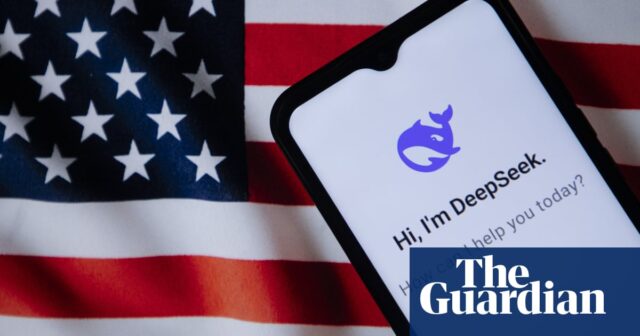DeepSeek’s release of an artificial intelligence model that could replicate the performance of OpenAI’s o1 at a fraction of the cost has stunned investors and analysts. Markets reeled as Nvidia, a microchip and AI firm, shed more than $500bn in market value in a record one-day loss for any company on Wall Street. Investors feared that DeepSeek challenged the dominance of US AI leaders.
Donald Trump described DeepSeek as a “wake-up call”. In China, DeepSeek’s founder, Liang Wenfeng, has been hailed as a national hero and was invited to attend a symposium chaired by China’s premier, Li Qiang. The pace at which China has been able to catch up with frontier AI research in the US is accelerating.
But DeepSeek is not the only Chinese company to have innovated despite the embargo on advanced US technology. Matt Sheehan, a fellow at the Carnegie Endowment for International Peace and an expert on Chinese AI, said: “If the US government thinks all we need to do is crush DeepSeek and then we’ll be OK, then we’re in for a rude surprise.”
In recent weeks, other Chinese technology companies have rushed to publish their latest AI models, which they claim are on a par with those developed by DeepSeek and OpenAI.
But what are the Chinese AI companies that could match DeepSeek’s impact?
Alibaba Cloud
On 29 January, the first day of the lunar new year holiday, leading Chinese technology company Alibaba Cloud, a subsidiary of Alibaba, released an updated version of its Qwen 2.5 AI model, called Qwen 2.5-Max.
According to Alibaba Cloud, Qwen 2.5-Max outperforms DeepSeek V3 and Meta’s Llama 3.1 across 11 benchmarks. The company said that it was “full of confidence in the next version of Qwen 2.5-Max”.
Some analysts said that the fact that Alibaba Cloud chose to release Qwen 2.5-Max just as businesses in China closed for the holidays reflected the pressure that DeepSeek has placed on the domestic market. But Sheehan said it may also have been an attempt to ride on the wave of publicity for Chinese models generated by DeepSeek’s surprise.
Zhipu
Zhipu is a Beijing-based start-up that is backed by Alibaba. Known as one of China’s “AI tigers”, it was in the headlines recently not for its AI achievements but for the fact that it was blacklisted by the US government. On 15 January, Zhipu was one of more than two dozen Chinese entities added to a US restricted trade list. Zhipu in particular was added for allegedly aiding China’s military advancement with its AI development. Zhipu condemned the decision and said it lacked a factual basis.
Allegations about military uplift aside, it is clear that Zhipu’s progress in the AI space is rapid. Its most recent product is AutoGLM, an AI assistant app released in October, which helps users to operate their smartphones with complex voice commands.
Moonshot AI
On the same day that DeepSeek released its R1 model, 20 January, another Chinese start-up released an LLM that it claimed could also challenge OpenAI’s o1 on mathematics and reasoning.
Moonshot AI is another Alibaba-backed AI start-up, based in Beijing and valued at $3.3bn. Unlike Alibaba, a behemoth that was founded in 1999, Moonshot AI is a relative newcomer. Like DeepSeek, it was founded in 2023.
Its offering, Kimi k1.5, is the upgraded version of Kimi, which was launched in October 2023. It attracted attention for being the first AI assistant that could process 200,000 Chinese characters in a single prompt. Moonshot AI later said Kimi’s capability had been upgraded to be able to handle 2m Chinese characters.
Moonshot AI “is in the top echelons of Chinese start-ups”, Sheehan said. “It wouldn’t surprise me at all if Moonshot or Zhipu has a model that equals or comes close to DeepSeek in performance within the next weeks or months.”
ByteDance
Another lunar new year release came from ByteDance, TikTok’s parent company. On 29 January it unveiled Doubao-1.5-pro, an upgrade to its flagship AI model, which it said could outperform OpenAI’s o1 in certain tests.
As well as performance, Chinese companies are challenging their US competitors on price. Doubao’s most powerful version is priced at 9 yuan per million tokens, which is nearly half the price of DeepSeek’s offering for DeepSeek-R1. For comparison, OpenAI’s o1 costs the equivalent of 438 yuan for the same usage.
Tencent
Primarily known for gaming and WeChat, the ubiquitous messaging app, Tencent has also made strides in AI. Its flagship model is a text-to-video generator called Hunyuan, which Tencent said can perform as well as Meta’s Llama 3.1. Some estimates suggest that Hunyuan required around a tenth of the computing power used by Meta to train Llama.






